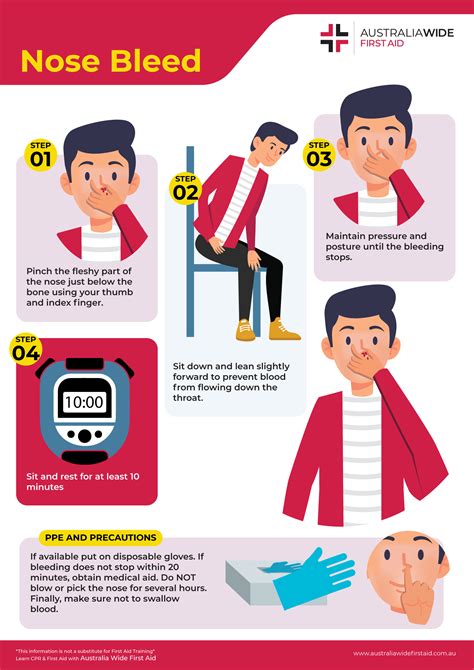Intro
Learn how to stop bloody nose bleeding fast with effective remedies and techniques, including cold compress, nasal packs, and more to prevent nosebleed complications and promote healing.
Nosebleeds, also known as epistaxis, can be a frightening and uncomfortable experience, especially when they occur unexpectedly. The sight of blood flowing from the nose can be alarming, and it's essential to know how to stop the bleeding quickly and effectively. Nosebleeds can be caused by a variety of factors, including dry air, allergies, colds, sinus infections, and even minor injuries. In most cases, nosebleeds are not a cause for concern and can be treated with simple first aid techniques.
However, in some cases, nosebleeds can be a sign of a more serious underlying condition, such as high blood pressure, a bleeding disorder, or a tumor. It's crucial to seek medical attention if you experience frequent or severe nosebleeds, as they can be a symptom of a more significant health issue. For minor nosebleeds, there are several methods to stop the bleeding fast, and it's essential to learn these techniques to avoid unnecessary panic and discomfort. By understanding the causes of nosebleeds and learning how to treat them, you can take control of your health and reduce the risk of complications.
Nosebleeds can occur at any time, and it's not uncommon for them to happen when you're in a public place or in a situation where you're not prepared. That's why it's vital to know how to stop a bloody nose quickly and effectively. Whether you're experiencing a minor nosebleed or a more severe one, there are steps you can take to stop the bleeding and prevent further complications. In this article, we'll explore the causes of nosebleeds, the different types of nosebleeds, and most importantly, the methods to stop the bleeding fast.
Understanding Nosebleeds

Causes of Nosebleeds
Nosebleeds can be caused by a variety of factors, including: * Dry air * Allergies * Colds * Sinus infections * Minor injuries * High blood pressure * Bleeding disorders * Tumors It's essential to identify the underlying cause of the nosebleed to determine the best course of treatment. In some cases, nosebleeds can be a sign of a more serious underlying condition, and seeking medical attention is crucial.Methods to Stop Nosebleeds

Applying Pressure to the Nose
Applying pressure to the nose is the most common method to stop nosebleeds. To apply pressure, follow these steps: 1. Sit up straight and lean forward to prevent blood from flowing down the back of the throat. 2. Use your thumb and index finger to pinch the soft part of the nose shut. 3. Apply firm pressure for 5-10 minutes to allow the blood to clot. 4. Release the pressure and check if the bleeding has stopped.Preventing Nosebleeds

When to Seek Medical Attention
While most nosebleeds can be treated with simple first aid techniques, there are cases where medical attention is necessary. Seek medical attention if: * The bleeding is heavy or doesn't stop after 10-15 minutes of pressure * You experience frequent or severe nosebleeds * You have a history of bleeding disorders or high blood pressure * You have a tumor or cancer * You're taking medications that can increase the risk of bleedingTreatments for Frequent or Severe Nosebleeds

Complications of Nosebleeds
While nosebleeds are usually not life-threatening, there are potential complications to be aware of. Complications may include: * Anemia: a condition where the body doesn't have enough red blood cells * Infection: bacteria can enter the body through the nose and cause infection * Scarring: repeated nosebleeds can cause scarring in the nose * Septicemia: a condition where bacteria enter the bloodstream and cause infectionConclusion and Next Steps

What are the most common causes of nosebleeds?
+Nosebleeds can be caused by a variety of factors, including dry air, allergies, colds, sinus infections, and minor injuries. In some cases, nosebleeds can be a sign of a more serious underlying condition, such as high blood pressure, a bleeding disorder, or a tumor.
How can I prevent nosebleeds?
+Preventing nosebleeds is essential to reduce the risk of complications. Tips to prevent nosebleeds include using a humidifier to add moisture to the air, avoiding picking or blowing the nose, using saline nasal sprays to keep the nasal passages moist, and avoiding exposure to allergens and irritants.
When should I seek medical attention for a nosebleed?
+Seek medical attention if the bleeding is heavy or doesn't stop after 10-15 minutes of pressure, you experience frequent or severe nosebleeds, you have a history of bleeding disorders or high blood pressure, you have a tumor or cancer, or you're taking medications that can increase the risk of bleeding.
